When selecting a web hosting provider for your e-commerce site, prioritising security features is crucial. Essential elements such as SSL certificates and DDoS protection play a vital role in safeguarding sensitive customer information and ensuring a seamless shopping experience. By understanding these security measures, you can make an informed choice that enhances both your site’s performance and its protection against online threats.
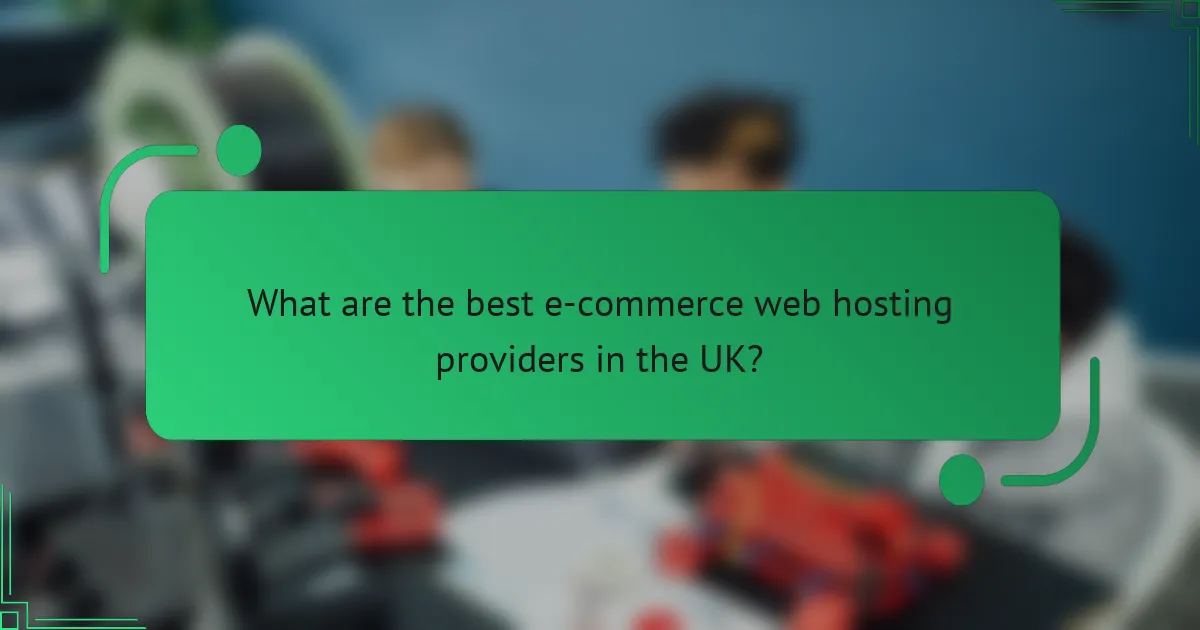
What are the best e-commerce web hosting providers in the UK?
The best e-commerce web hosting providers in the UK offer robust security features, including SSL certificates and DDoS protection, essential for safeguarding online transactions. Choosing the right provider can significantly impact your site’s performance and security, ensuring a safe shopping experience for customers.
SiteGround
SiteGround is known for its excellent customer support and strong security measures, making it a top choice for e-commerce websites. It provides free SSL certificates and daily backups, which are crucial for protecting sensitive customer data.
Additionally, SiteGround employs advanced DDoS protection to mitigate potential attacks, ensuring your online store remains accessible. Its hosting plans are competitively priced, starting from around £6 per month, offering good value for the features provided.
Bluehost
Bluehost is a popular web hosting provider that offers a variety of e-commerce solutions. It includes free SSL certificates with all plans, which helps secure transactions and build customer trust.
Moreover, Bluehost features integrated DDoS protection and a user-friendly interface, making it easy for beginners to set up their online stores. Plans typically start at approximately £3 per month, making it an affordable option for small businesses.
Hostinger
Hostinger stands out for its budget-friendly pricing while still offering essential e-commerce features. It provides free SSL certificates and robust security protocols, ensuring that customer transactions are encrypted and secure.
Hostinger also includes DDoS protection as part of its hosting plans, which start at around £1.99 per month. This makes it an attractive choice for startups looking to minimise costs without compromising on security.
WP Engine
WP Engine is a premium managed WordPress hosting provider that excels in e-commerce capabilities. It offers free SSL certificates and advanced security features tailored for online stores, ensuring compliance with industry standards.
With built-in DDoS protection and automatic backups, WP Engine provides peace of mind for e-commerce businesses. However, its plans are on the higher end, starting at approximately £20 per month, reflecting the quality of service and support provided.
Cloudways
Cloudways offers a flexible cloud hosting solution ideal for e-commerce websites. It provides free SSL certificates and a range of security features, including DDoS protection, to keep your online store secure.
With a pay-as-you-go pricing model, Cloudways allows you to scale your resources as needed, starting at around £10 per month. This flexibility is beneficial for businesses experiencing growth or seasonal spikes in traffic.
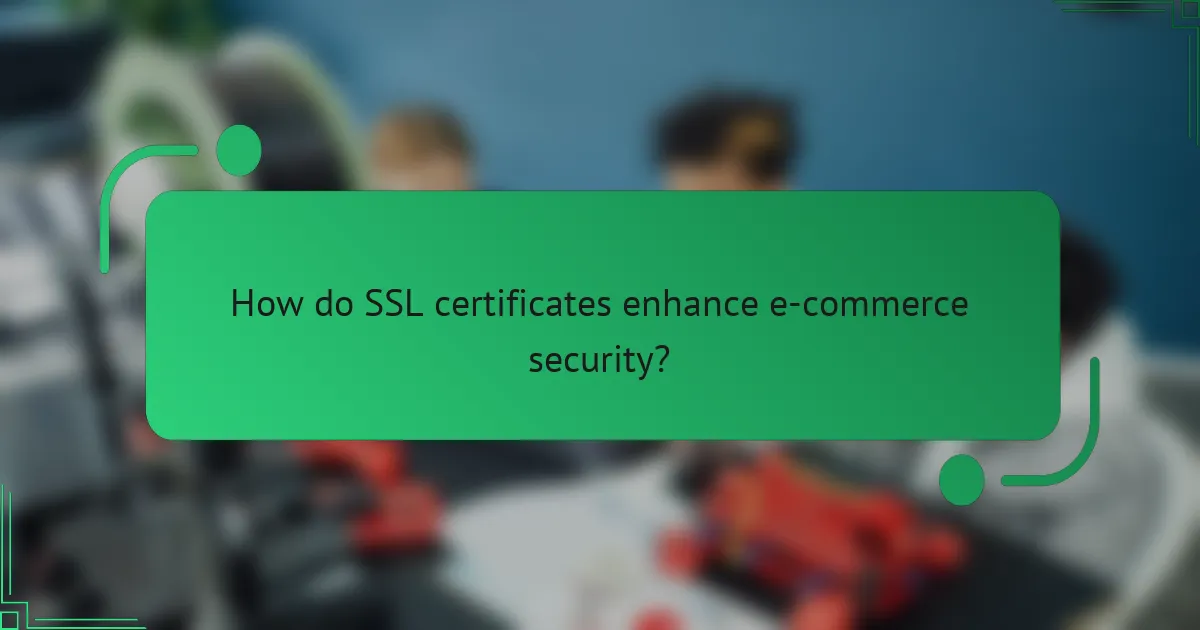
How do SSL certificates enhance e-commerce security?
SSL certificates significantly enhance e-commerce security by encrypting data exchanged between the customer and the website. This encryption protects sensitive information, such as credit card details and personal data, from interception during online transactions.
Data encryption
Data encryption is a core function of SSL certificates, ensuring that any information transmitted is scrambled and unreadable to unauthorized parties. When a customer enters their details on a secure site, the SSL protocol encrypts this data, making it nearly impossible for hackers to access it. This layer of security is crucial for maintaining customer trust and safeguarding sensitive transactions.
For e-commerce sites, using strong encryption standards, such as AES-256, is advisable to provide robust protection. Regularly updating SSL certificates and protocols also helps mitigate vulnerabilities that could be exploited by cybercriminals.
Trust signals for customers
SSL certificates serve as trust signals for customers, indicating that a website is secure and that their data will be protected. When a site has an SSL certificate, it displays a padlock icon in the browser’s address bar, along with “https://” at the beginning of the URL. These visual cues reassure customers that they are on a secure site, which can lead to increased conversion rates.
To further enhance trust, consider displaying security badges from reputable third-party security providers on your website. This can help reinforce the message that your e-commerce platform prioritises customer security.
Compliance with regulations
Many regulations, such as the General Data Protection Regulation (GDPR) in Europe, require e-commerce businesses to implement adequate security measures to protect customer data. SSL certificates help businesses comply with these regulations by ensuring that data is encrypted during transmission, thereby reducing the risk of data breaches.
Failure to comply with such regulations can result in hefty fines and damage to your brand’s reputation. Therefore, obtaining and maintaining a valid SSL certificate is not just a best practice but a necessary step for legal compliance in many jurisdictions.
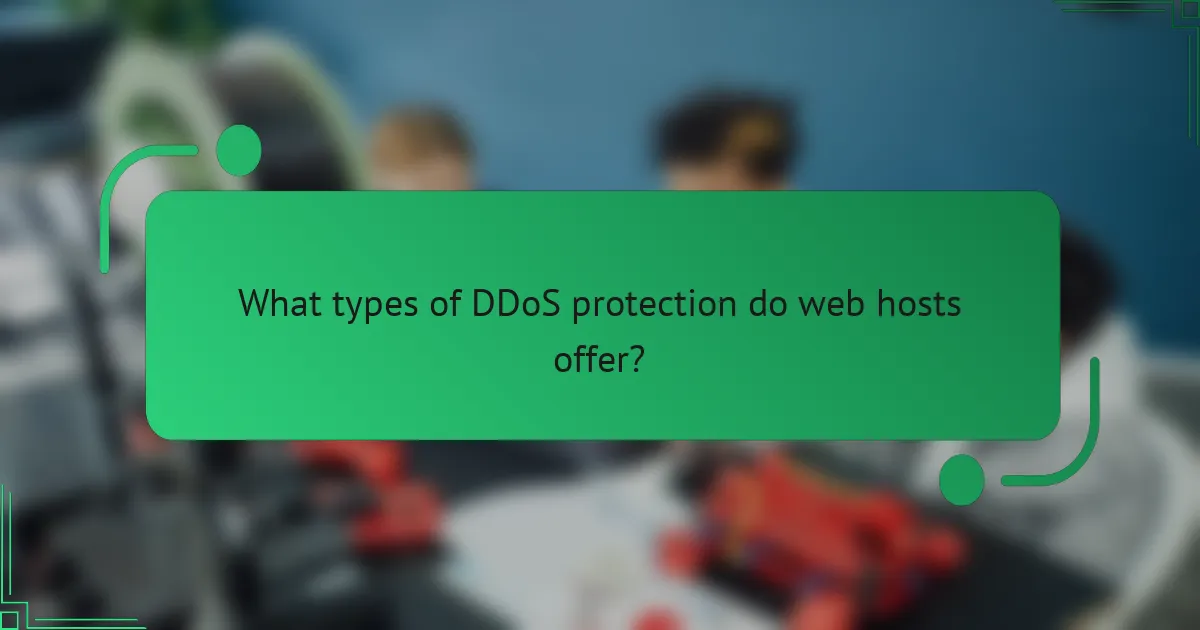
What types of DDoS protection do web hosts offer?
Web hosts typically provide several types of DDoS protection to safeguard websites from malicious traffic aimed at overwhelming their servers. Key methods include traffic filtering, rate limiting, and integration with content delivery networks (CDNs).
Traffic filtering
Traffic filtering involves analysing incoming data packets to identify and block harmful traffic before it reaches the server. This method can be highly effective in mitigating attacks by allowing only legitimate requests through while discarding suspicious ones.
When choosing a web host, consider their filtering capabilities, such as the ability to distinguish between normal and malicious traffic patterns. Some hosts may offer advanced filtering options that adapt to evolving threats.
Rate limiting
Rate limiting restricts the number of requests a user can make to a server within a specified timeframe. This helps prevent a single user or bot from overwhelming the server with excessive requests, which is a common tactic in DDoS attacks.
Look for hosts that allow customisation of rate limits based on your website’s traffic patterns. Effective rate limiting can significantly reduce the impact of DDoS attacks while ensuring legitimate users have access to your site.
Content delivery network (CDN) integration
CDN integration enhances DDoS protection by distributing website content across multiple servers worldwide. This not only speeds up content delivery but also helps absorb and mitigate attack traffic by spreading it across the network.
When selecting a web host, consider whether they offer seamless integration with reputable CDNs. Many CDNs have built-in DDoS protection features, making them a valuable addition to your overall security strategy.
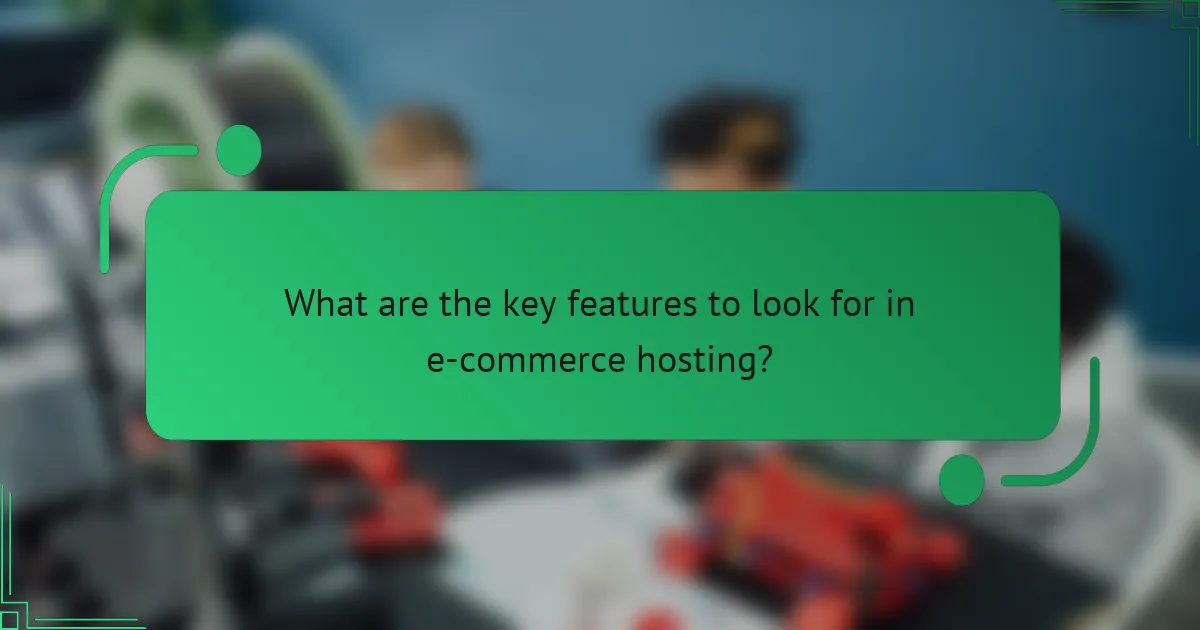
What are the key features to look for in e-commerce hosting?
When selecting e-commerce hosting, focus on features that ensure your online store operates smoothly and securely. Key aspects include scalability, uptime guarantees, and reliable customer support, all of which contribute to a seamless shopping experience for your customers.
Scalability
Scalability refers to the ability of your hosting service to handle increased traffic and transactions as your business grows. Look for providers that offer flexible plans, allowing you to upgrade resources like bandwidth and storage without significant downtime.
Consider options such as cloud hosting, which can automatically adjust resources based on demand. This ensures your site remains responsive during peak shopping periods, such as holidays or sales events.
Uptime guarantees
Uptime guarantees indicate the reliability of your hosting service, typically expressed as a percentage. A good provider should offer at least 99.9% uptime, meaning your site is accessible almost all the time.
Downtime can lead to lost sales and damage your reputation. Check for service level agreements (SLAs) that outline compensation for any downtime, ensuring you are protected against service interruptions.
Customer support
Reliable customer support is crucial for resolving issues quickly and maintaining your online store’s functionality. Look for hosting providers that offer 24/7 support through multiple channels, such as live chat, phone, and email.
Evaluate the quality of support by reading reviews and checking response times. A responsive support team can help you navigate technical challenges, allowing you to focus on growing your e-commerce business.
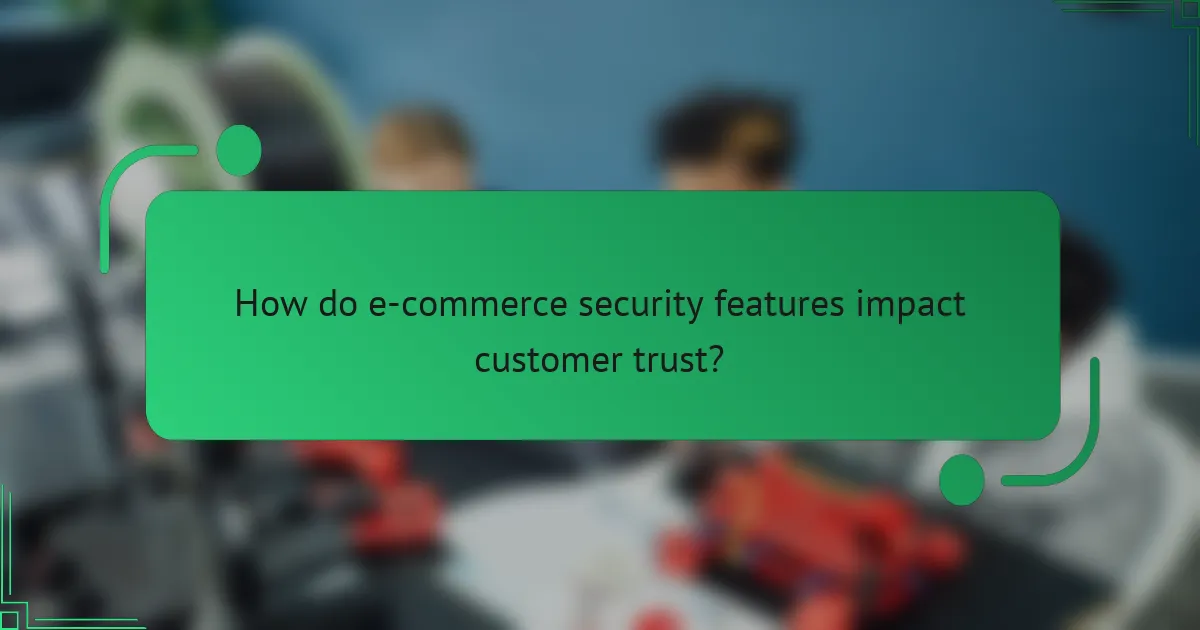
How do e-commerce security features impact customer trust?
E-commerce security features significantly enhance customer trust by ensuring that their sensitive information is protected during online transactions. When customers feel secure, they are more likely to complete purchases and return for future transactions.
Improved transaction safety
Improved transaction safety is crucial for e-commerce platforms as it directly influences customer confidence. Features such as SSL certificates encrypt data exchanged between the customer and the website, safeguarding personal and financial information from potential breaches.
To ensure transaction safety, e-commerce businesses should implement robust security protocols, including regular software updates and vulnerability assessments. Additionally, displaying security badges and certifications on the website can reassure customers about the safety of their transactions.
It’s advisable to choose hosting providers that offer built-in security features, such as DDoS protection and firewalls, to further enhance transaction safety. Regularly reviewing and updating security measures can help maintain a secure shopping environment, ultimately fostering customer loyalty.